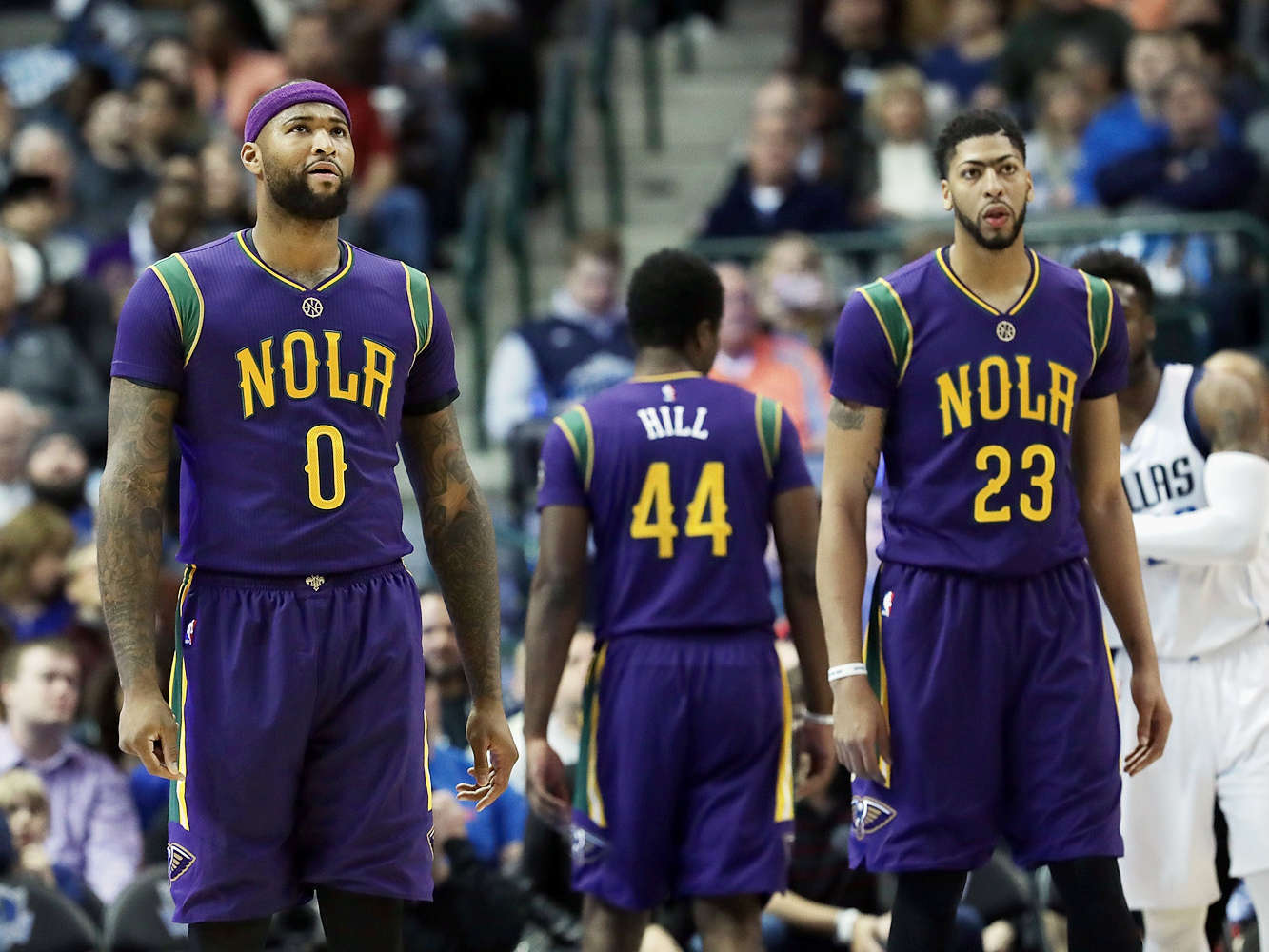The New Orleans Pelicans’ stunning blockbuster trade for DeMarcus Cousins marked a significant shift in direction for a floundering franchise.
By adding Cousins at an insignificant cost, the Pelicans not only made a move to win games sooner rather than later, they also kicked off perhaps the most fascinating experiment in the NBA.
There simply isn’t another team in the NBA pairing two legitimate big men like Cousins and Anthony Davis together. While the rest of the league has gone smaller, faster, and more spread out, the Pelicans doubled down on a bygone construction, combining perhaps the two most talented, versatile big men in the NBA.
Simply put, the Pelicans are zigging as the NBA zags.
Three games after the trade, the transition hasn’t been smooth. The Pelicans are 0-3 since the All-Star break, with losses to the Houston Rockets, Dallas Mavericks, and Oklahoma City Thunder.
Figuring out how to combine two immense offensive talents in Davis and Cousins was always going to be struggle, never mind doing it on the fly, during the regular season. Three games into the experiment, some of the initial concerns about such a pairing - the same concerns that have caused other teams to drift away from having big men share the floor - are rearing their head.
With Cousins and Davis sharing the floor, the Pelicans are scoring just 95.8 points per 100 possessions, a mark that would easily be the worst in the NBA if it were sustained, per the NBA's stats site. The combo hasn't been much better defensively, allowing 106.9 points per 100 possessions. The Pelicans were allowing 104.7 points per 100 possessions prior to the trade.
Additionally, Cousins and Davis' shooting splits suggest that they're having an easier time without one another on the floor. With Davis on the floor, Cousins is shooting just 43% from the field. With Davis off the floor, Cousins is shooting 60%. Interestingly, Cousins' field goal percentage from less than five feet drops dramatically with Davis on the court. With Davis on the floor, Cousins has shot just 40% from the less than five feet, compared to 77.8% with Davis off the floor, suggesting there's not as much room to operate.
The same goes for Davis. He's shooting 44% with Cousins on the floor, as opposed to 51% with Cousins on the bench. His field goal percentage from less than five feet also increases from 64% with Cousins on the floor to 73% with him off of it.
Both players are skilled, versatile scorers, with shooting range out to the three-point line. But neither are tremendous threats on the perimeter, and thus, when one player is working in the post, the spacing is a little cramped.
The roster is part of the problem, as the Pelicans lack the shooters to truly fan out defenses. But, as seen above, some of it may just be unfamiliarity. A few Pelicans players on the above play crashed toward the paint, seemingly unsure of whether Cousins would hit them on a cut or take it himself. Thus, the Mavericks defense completely collapsed onto Cousins.

On this play, Davis had to create his own difficult shot, with several Mavs packing the paint, simply because Dallas chose to ignore the Pelicans on the perimeter - including Cousins.

The idea that Cousins and Davis could function better on their own wasn't helped by a 118-110 loss to the Oklahoma City Thunder on Sunday. Cousins picked up two early fouls and went to the bench in the first quarter. Davis went off for 24 points in the quarter. In the second quarter, Cousins scored 19 points while Davis played just two minutes of action.
Again, some of this is the Pelicans' roster. Only three players on the Pelicans have shot 36% or better ob over 100 attempts from three. They had two others in Langston Galloway and Buddy Hield, but both were traded to the Kings. The shooting just isn't there.
However, with enough smart cutters and passers, Cousins and Davis can surely coexist, even if perfect spacing isn't achieved. Plenty of other teams have survived without playing four-our offense if they have players who can continue moving and make quick passes before the defense adjusts.
Similarly, the Cousins-Davis pick-and-roll could be a serious weapon with enough time.
While playing Cousins and Davis together may come with the typical complications, this is a reminder that they're not traditional big men, either. No other team boasts two such skilled, athletic big men, with the ability to work off the dribble and pass.
The Pelicans may also get a boost when Jrue Holiday gets his bearings running this new-look team. Since the All-Star break, Holiday is averaging just 10 points on 29% shooting, 14% from three, and five turnovers per game. Davis told ESPN's Justin Verrier that Holiday is likely overthinking it and trying to be too deferential to help the rest of the team get in a flow.
"We don't need him to come out and try to be a guy who can get 15 assists," Davis said. "That's not who he is, that's not how he's been helping us. He's been [getting] seven, eight assists but makes sure he's scoring. And we need him to score. We need him to be who he is - a great scorer and a great defender."
What's clear is this molding process may take a while - perhaps even into next season. Adding a centerpiece like Cousins on the fly wouldn't be an easy transition for any team, but especially not one that already has a big man who was the focal point of the offense
The Pelicans have a steep road to make the postseason. They're currently in 13th place, only 3.5 games out of the playoffs. However, the eighth-place Denver Nuggets are currently on pace to win 36 games. Just to make it to 37-45, the Pelicans would have to go 14-8 the rest of the way, and that's assuming the other four teams they'd have to leap-frog will just stand pat and not make a run themselves. Talks of a Warriors-Pelicans first-round series may have been a bit premature.
Nonetheless, these last 22 games are going to be important for the Pelicans. They'll have to weigh, not only ways to help Cousins and Davis jell, but what kinds of pieces to put around them ease the process. The rest of the league will be watching as the Pelicans defiantly buck a trend.

